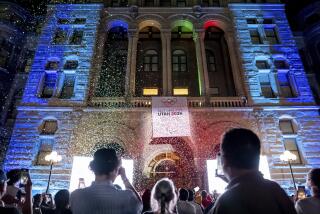Large Families Make Utah Fertile Ground for Genetics Researchers
- Share via
SALT LAKE CITY — What do you get when you pair a Mormon’s affinity for big families and genealogy with his enthusiasm for advancing science?
A geneticist’s dream come true: a welcome at Utah family reunions.
Where else can a researcher collect 200 blood samples in one day to learn whether premature labor or an infant’s enlarged heart runs in a family, asks Ken Ward, an obstetrician and geneticist at the University of Utah.
Ward and colleagues have been invited to countless reunions since he came to Salt Lake 12 years ago, drawn by its reputation as a mecca for genetic research.
“We set up a little shade tent and have some orange juice and a phlebotomist,” Ward says. “In between softball and hot dogs, people will run by to share family history, sign consent forms, learn about the study and, frequently, roll up their shirt sleeves and give a blood sample.”
Geneticists for 50 years have recognized the value of Utah’s extended families and their precise genealogical records. And in the 20 years that genetics has been revolutionizing medical science, Salt Lake City has become one of the centers of that research.
The University of Utah isn’t alone. The Howard Hughes Medical Institute and the Huntsman Cancer Institute, searching for genetic causes of disease from a base at the university, also attract top researchers.
“It’s a matter of having built up over the years a critical mass of very good research people,” says Richard Koehn, the university’s vice president of research and a geneticist himself. That in itself can act as a magnet, he said.
Ward compares his research in genetics here to earlier work in Washington, D.C., where patients often didn’t know their medical histories or where to find their siblings.
“Here, you’re likely to have met dozens of your cousins and to have seen the premature baby who is still on an oxygen tank at the family reunion,” Ward says.
Most of Ward’s gene research begins with patients who, when queried, know of parents, siblings or cousins with similar problems. Using this approach, Ward discovered two genes involved in pregnancy toxemia.
“Families here tend to be a little closer knit and more involved, for better or worse, in each other’s lives,” Ward says. “Because of this phenomenon, we are able to see patterns that may not be as obvious to other investigators.”
DNA from three generations of several Utah families is part of a repository in France where geneticists worldwide obtain samples to create genetic maps. Utah contributions, says Ward, have been among the most useful because of the size of the families.
Utah’s “founder population” makes the state unique. Several thousand Mormon pioneers, many of them polygamous, settled the Intermountain West beginning in the 1840s. They had large families that often stayed put.
About 2 million residents of Utah, Idaho, Nevada, northern Arizona, western Colorado and parts of Wyoming and Montana can trace their roots to those Mormons.
“If the original pioneer had a mutation responsible for cancer that spread through the family, that can be traced fairly easy,” says Bill Hockett, spokesman for Myriad Genetics Inc., a company searching for genetic causes of disease with the hope of developing treatments.
Only Iceland and some remote island populations can rival Utah for its value to genetics research, with founder populations and extensive genealogical data, he says.
Myriad, founded by former University of Utah researcher Mark Skolnick, identified a gene involved in breast and ovarian cancers. As the tests gained market acceptance, Myriad’s revenue rose 339% last year.
Now the company has discovered a gene related to heart disease and is closing in on others related to asthma and other cancers. It is also looking into genetic causes of depression and dementia. “You couldn’t do the same thing in many places in the world,” Hockett says.
Other companies also are leveraging off the university’s expertise in genetics. Biotechnology companies, many using genetics to varying degrees, now employ 11,000 workers in Utah, up more than 25% in three years.
Researchers often tap genealogical data that the Church of Jesus Christ of Latter-day Saints gave to the university. The church gathers information so members can perform sacred temple ordinances for the dead.
Access to that genealogical information is strictly limited, Koehn says, and the church gives the university no names of living people to protect their privacy.
But for him, the real value of the genealogical data comes with cross-matching against other databases such as the Utah Cancer Registry and state birth and death records.
Even more valuable than the records, though, is the culture of cooperation among Mormons.
Koehn, who came from New York six years ago, noticed a different attitude right away. “It’s not so much, ‘What’s in it for me?’ It’s, ‘It sounds like a good idea. We’d all be better off if we did it.’ ”
The last time Ward kept track, about three years ago, only a dozen of 15,000 people refused to participate in a study.
To explain cooperation that he calls “legendary,” Ward recalls a woman in rural Utah, now in her 60s, who had lost every other one of her babies to heart defects.
“Every time the obstetrician would come for one of my deliveries,” she reported, “he’d bring a box to bury the baby just in case.”’
Now, Ward says, she watches her surviving children bury their babies.
“When you see that going on in your family,” he says, “the cooperation is understandable.”






